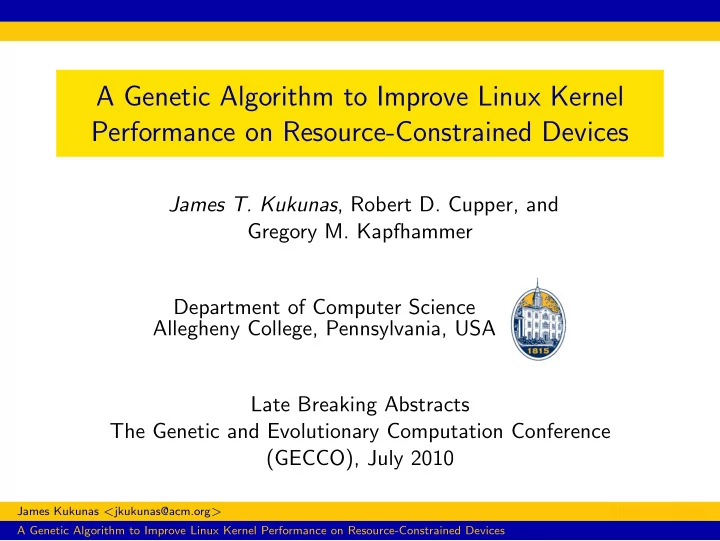

A Genetic Algorithm to Improve Linux Kernel Performance on Resource-Constrained Devices James T. Kukunas , Robert D. Cupper, and Gregory M. Kapfhammer Department of Computer Science Allegheny College, Pennsylvania, USA Late Breaking Abstracts The Genetic and Evolutionary Computation Conference (GECCO), July 2010 James Kukunas < jkukunas@acm.org > Allegheny College A Genetic Algorithm to Improve Linux Kernel Performance on Resource-Constrained Devices
What is a Resource-Constrained Device? A Resource-Constrained Device Is . . . Any Device In Which Resources Are Intentionally Constrained James Kukunas < jkukunas@acm.org > Allegheny College A Genetic Algorithm to Improve Linux Kernel Performance on Resource-Constrained Devices
What is a Resource-Constrained Device? A Resource-Constrained Device Is . . . Any Device In Which Resources Are Intentionally Constrained James Kukunas < jkukunas@acm.org > Allegheny College A Genetic Algorithm to Improve Linux Kernel Performance on Resource-Constrained Devices
Why Do We Intentionally Constrain Resources? VS The Goal of This Research is to . . . Achieve BMW Performance With A Honda Motor While Keeping Honda Benefits James Kukunas < jkukunas@acm.org > Allegheny College A Genetic Algorithm to Improve Linux Kernel Performance on Resource-Constrained Devices
Intel Atom Specifics: In-Order Execution Memory Pipeline Instruction Buffer Out-of-Order Instruction Execution Hardware Dynamically Reorders Instructions to Reduce Dependency Stalls in the Pipeline James Kukunas < jkukunas@acm.org > Allegheny College A Genetic Algorithm to Improve Linux Kernel Performance on Resource-Constrained Devices
Intel Atom Specifics: In-Order Execution Memory Pipeline In-Order Instruction Execution Pipeline Sensitive to Depedency Stalls James Kukunas < jkukunas@acm.org > Allegheny College A Genetic Algorithm to Improve Linux Kernel Performance on Resource-Constrained Devices
Intel Atom Specifics: In-Order Execution Program Compiler Memory Pipeline Pipeline Modeling . . . At Compile-Time Reduces Dependency Stalls James Kukunas < jkukunas@acm.org > Allegheny College A Genetic Algorithm to Improve Linux Kernel Performance on Resource-Constrained Devices
Intel Atom Specifics: Power-Aware Cache CPU Cache At Higher Processor Power States . . . All Caches Blocks are Enabled James Kukunas < jkukunas@acm.org > Allegheny College A Genetic Algorithm to Improve Linux Kernel Performance on Resource-Constrained Devices
Intel Atom Specifics: Power-Aware Cache CPU Cache At Lower Processor Power States . . . Cache Blocks are Disabled to Conserve Power James Kukunas < jkukunas@acm.org > Allegheny College A Genetic Algorithm to Improve Linux Kernel Performance on Resource-Constrained Devices
What is the Linux Kernel? Hardware Peripherals CPU Mem Disk James Kukunas < jkukunas@acm.org > Allegheny College A Genetic Algorithm to Improve Linux Kernel Performance on Resource-Constrained Devices
What is the Linux Kernel? System Layout User Space Applications System Calls Kernel Space I/O Mem. Mgmt Proc. Mgmt Interrupts Hardware Peripherals CPU Mem Disk James Kukunas < jkukunas@acm.org > Allegheny College A Genetic Algorithm to Improve Linux Kernel Performance on Resource-Constrained Devices
Precise Fitness Metric System Calls with Counts > 26 open stat64 System Calls mmap2 close fstat64 getxattr read 50 100 150 200 System Call Counts (#) Fitness Metric System Calls Model User/Kernel Space Interaction James Kukunas < jkukunas@acm.org > Allegheny College A Genetic Algorithm to Improve Linux Kernel Performance on Resource-Constrained Devices
Precise Fitness Metric System Calls with Counts > 26 open stat64 System Calls mmap2 close fstat64 getxattr read 50 100 150 200 System Call Counts (#) Fitness Metric Only 10% of System Calls had Non-Zero Counts James Kukunas < jkukunas@acm.org > Allegheny College A Genetic Algorithm to Improve Linux Kernel Performance on Resource-Constrained Devices
Genetic Algorithm Initialization Initialize Population Parse Compiler Flags Bit String Representation Of Enabled Compiler Flags Initialization: Individual Represents Enabled Compiler Options James Kukunas < jkukunas@acm.org > Allegheny College A Genetic Algorithm to Improve Linux Kernel Performance on Resource-Constrained Devices
Genetic Algorithm Initialization Fitness Operator Build Kernel With Send Kernel To Netbook Micro−Benchmarking Specified Compiler Flags Fitness Operator: System Call Micro-Benchmarking James Kukunas < jkukunas@acm.org > Allegheny College A Genetic Algorithm to Improve Linux Kernel Performance on Resource-Constrained Devices
Genetic Algorithm Selection and Initialization Fitness Operator Crossover Operators Top 75% Reproduce Bottom 25% Discarded Enough to Replace Bottom 25% Selection Operator: Enforces Strong Elitism James Kukunas < jkukunas@acm.org > Allegheny College A Genetic Algorithm to Improve Linux Kernel Performance on Resource-Constrained Devices
Genetic Algorithm Selection and Mutation Operator Initialization Fitness Operator Crossover Operators 1% Chance of a Bit Flip Mutation Operator: Too Much Mutation Masks Evolution James Kukunas < jkukunas@acm.org > Allegheny College A Genetic Algorithm to Improve Linux Kernel Performance on Resource-Constrained Devices
Genetic Algorithm Selection and Mutation Operator Initialization Fitness Operator Crossover Operators Result Analysis N Iterations Termination Condition: Predefined Generation Count James Kukunas < jkukunas@acm.org > Allegheny College A Genetic Algorithm to Improve Linux Kernel Performance on Resource-Constrained Devices
Results Analysis Results Analysis Technique Phoronix Test Suite Suite to emulate netbook workload SQLLite GnuPG Ogg CRay SciMark 7Zip GTKPerf James Kukunas < jkukunas@acm.org > Allegheny College A Genetic Algorithm to Improve Linux Kernel Performance on Resource-Constrained Devices
GTK Results The Fastest Evolved Kernel . . . is About 20 Seconds Faster James Kukunas < jkukunas@acm.org > Allegheny College A Genetic Algorithm to Improve Linux Kernel Performance on Resource-Constrained Devices
SQLLite The Fasted Evolved Kernel . . . is About 140 Seconds Faster James Kukunas < jkukunas@acm.org > Allegheny College A Genetic Algorithm to Improve Linux Kernel Performance on Resource-Constrained Devices
Conclusions and Future Work Conclusions Evolved Kernels Outperformed Stock Fedora Kernel Genetic Algorithm Excels at Finding Correlations Between Optimizations Future Work More Platforms More Compilers More GA Options James Kukunas < jkukunas@acm.org > Allegheny College A Genetic Algorithm to Improve Linux Kernel Performance on Resource-Constrained Devices
Conclusions and Future Work More Information at . . . Jim Kukunas < jkukunas@acm.org > http://member.acm.org/~treak007 James Kukunas < jkukunas@acm.org > Allegheny College A Genetic Algorithm to Improve Linux Kernel Performance on Resource-Constrained Devices
Recommend
More recommend